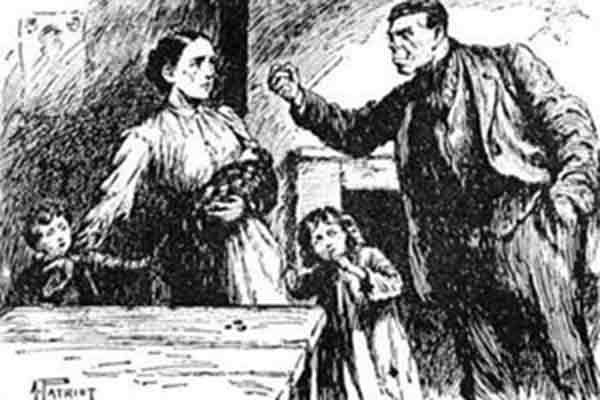An epic divorce battle: Wife said husband tried to poison her; husband accused wife of throwing swill on him
In late June of 1875, Lavinia Goodell was visited by a prospective new client. Elizabeth Leavenworth had started a divorce action against her husband, Ira, but was unhappy with her present lawyer and wanted Lavinia to take over the case. This was probably Lavinia’s most hard fought legal battle. The Rock County circuit court’s file in the Leavenworth divorce is one of the handful of Lavinia’s cases to have survived, so we not only have Lavinia’s diary entries and letters recounting her work on the case; we have the entire official court record.

Divorces were hard to come by in the 1800s. The petitioning party had to convince the court that grounds existed to dissolve the matrimonial bonds. The Rock County circuit court judge, Harmon Conger, looked for reasons not to grant a divorce, so Lavinia knew Mrs. Leavenworth faced an uphill battle. Still, Lavinia found Mrs. L’s case compelling.
The Leavenworths were in their fifties, were from rural Rock County, and were considered well-to-do. They had married in 1849. Their only child had died in 1861. Elizabeth’s complaint alleged that her husband was a man of violent temper who, after the death of their child, had commenced a course of cruel and inhuman treatment toward her. She said he had had been abusive for many years, had frequently struck her, knocked her down, and drove her out of the house. She even asserted that he had tried to poison her. In addition, she said he had conveyed their homestead to his brother in order to deprive her of alimony. Lavinia was sympathetic to Elizabeth but at first was uncertain whether she should get involved in the matter. She wrote in her diary:
I feel real sorry for her, but her case is beset with difficulties & hardly know how to take hold of it as her present lawyer is unwilling to give it up. Shall see about it tomorrow.
The following week, Lavinia read over Ira’s defense and said, “Am quite exorcised about said case.” Ira denied all of his wife’s claims and accused her of striking and scratching him and “throwing swill upon him.” By the third week in July, Lavinia had made up her mind. Elizabeth Leavenworth was now officially her client.

Lavinia was not impressed with the work of Mrs. Leavenworth’s former male counsel, saying the complaint was “horribly drafted and enough to ‘make a fellow swear.'” Her first course of action was to schedule depositions of key witnesses. She clearly enjoyed the process, writing to her sister:
Last week I went to Columbia County, about 80 miles from here, to attend the taking of some depositions in the new case. Had quite a rich time. The vicious husband was on hand with his lawyer & I had the pleasure of eliciting considerable unwilling testimony from his witnesses on cross examination & getting some good testimony from my own…. Was quite a “lion” in those regions. I was quite hard on the bad husband & expected he would be ready to eat me, but we came back to Janesville together & he was inclined to be quite attentive & devoted. It was very amusing. He actually complimented me on my ability in the management of my case! Perhaps he thinks he can humbug me!
Ira’s attorney was not happy with Elizabeth’s new lawyer. Lavinia reported that she ran into Ira’s counsel in the post office and he “lit into me on Leavenworth case. I think it is funny he talks so much with me about it.” Lavinia seemed to relish the battle of wits. She recounted:
I attended taking of depositions of two witnesses for Leavenworth, but am not much worried over their testimony as I succeeded in mixing them up in cross examination. Â
The trial began in late December of 1875 and lasted a week. The Janesville Gazette reported on each day’s proceedings, saying, “There are numerous witnesses in attendance, and the case is exciting considerable interest.” After a break for New Year’s, the Gazette reported:
[T]he trial of the Leavenworth divorce case was resumed, both parties coming up to the fight with renewed energies after two days of rest. Another great tidal wave of testimony was heaved in upon the judicial understanding, and the end does not seem to be visible yet.
Lavinia felt confident that her presentation was going well, saying, “Got along first rate…. Took evidence of country folks, which was very good & Mrs. L’s cross examination began & she stood it first rate. There was considerable humor on the case & some pathos.” And “Leavenworth cross examined and a good deal worsted…. Last day of taking testimony … and we had it hot and heavy. Wound up with impeaching L and two of his witnesses. Quite relieved now it is over. Argument adjourned for which I am truly thankful.”
Due to other court business, closing arguments in the case were not heard until late January 1876. Was Lavinia successful in obtaining a divorce for her client? To find out, subscribe to this blog. NK
Sources consulted: Lavinia Goodell’s diaries (June 30, 1875; July 6, 1875; September 7, 1875; October 6, 1875; December 28 1875; December 29, 1875; January 4, 1876; January 5, 1876); Janesville Daily Gazette (December 28, 1875; January 3, 1876); Leavenworth v. Leavenworth, Rock County Circuit Court.








I think she really enjoyed consisting rights of women. Made practic ing law fun sometimes
She loved practicing law, and sometimes it was great fun. She enjoyed the battle of taking depositions and arguing in court. She was a tireless researcher and often re-wrote arguments multiple times. It is doubtful any of her opponents were as well-prepared. She took her losses hard because she put so much of herself into her cases and she believed in her clients’ position.